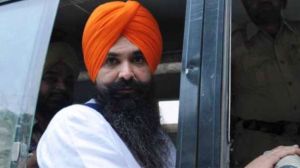Rocks on rails replay train tragedy in the Konkan hills
In an almost copycat accident from a year ago on the Konkan Railway, 14 people were killed and over 100 injured when the Mumbai-bound Matsya...

In an almost copycat accident from a year ago on the Konkan Railway, 14 people were killed and over 100 injured when the Mumbai-bound Matsyagandha Express from Mangalore derailed after it crashed into boulders washed on to the tracks by a mudslide.
The accident occurred at 6.10 am between Karanjadi and Veer near Roha in Raigad district of Maharashtra, some 200 km from Mumbai, when the train was travelling at over 80 kmph.
While the engine plunged more than 60 feet from the Ambovali bridge into a ravine, four coaches slid down from the tracks. Eight other coaches got derailed with some lying on their sides. The last seven bogies remained unaffected.
Last June, 49 people were killed in Ratnagiri in a similar accident on the tracks caused by a landslide on a rainy night.
Following that accident, the Konkan Railway Corporation (KRC) had installed, 10 m from the ground, steel nets running around the surface of the hill ‘‘cuttings’’ (the section cut out to make way for the railway line) to prevent boulders from falling on to the tracks.
Today, KRC managing director B Rajaram said that from now on, the steel nets would start from above 5 m. But today’s accident happened on a stretch where there was no netting at all. Speaking to The Indian Express from the disaster site, Divisional Officer of Konkan region, Ramesh M Ubale, said: ‘‘The boulders fell on the tracks due to the train vibrations which loosened them from the hill that had been cut for the rail line. This was not the section of the hill where there was safety netting.’’
Over the last five years, Konkan Railway has invested over Rs 60 crore in safety along the 760-km line on the country’s western coast. Warning devices like inclinometers—also known as Raksha Dhagas—have been installed along the tracks to sense disturbances in soil pattern.
However, Divisional Manager of the Ratnagiri zone, Shyam Sundar, said the ‘Raksha Dhaga’ had not been provided on this particular spot.
Railway minister Laloo Prasad Yadav has ordered an inquiry into the accident by Commissioner, Railway Safety, Western region and announced Rs one lakh compensation to the kin of each of those killed and Rs 5,000-Rs 15,000 to each of the injured.
Sources said that the accident had also focused attention on the need for better monsoon patrolling of the tracks in the area and stricter enforcement of speed limits—as per regulations of the Railway’s Safety Directorate, a train should not exceed 50 kmph on such stretches.
Photos



- 01
- 02
- 03
- 04
- 05




























